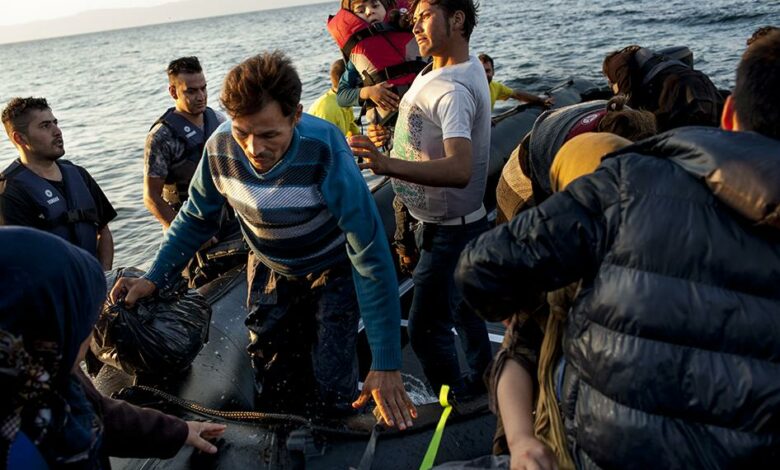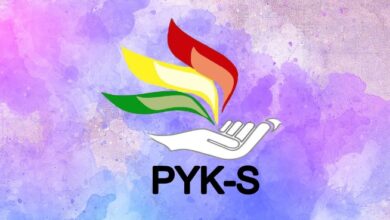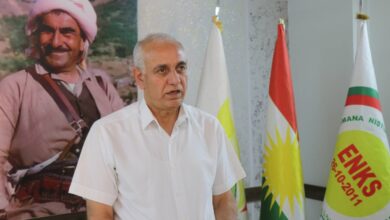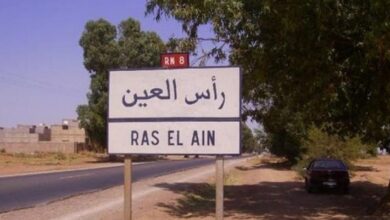
Greece: Attacks on Boats Risk Migrant Lives
(Athens) – Armed masked men have been disabling boats carrying migrants and asylum seekers in the Aegean Sea and pushing them back to Turkish waters, Human Rights Watch said today.
Human Rights Watch spoke to nine witnesses who described eight incidents in which masked assailants – often armed – intercepted and disabled the boats carrying asylum seekers and migrants from Turkey toward the Greek islands, most recently on October 7 and 9, 2015. The witnesses said that the assailants deliberately disabled their boats by damaging or removing the engines or their fuel, or puncturing the hulls of inflatable boats. In some cases, the boats were towed to Turkish waters.
Attacks at Sea and Pushbacks to Turkey
On October 10, a rubber boat carrying Afghans arrived on Lesbos. Passengers confirmed that they had been on one of four boats attacked the previous day. Human Rights Watch had witnessed one adrift in the waters between Turkey and Lesbos for more than an hour before the Spanish volunteers rescued them. Passengers said they had been towed back to Turkey by the Turkish coast guard, then made the crossing again the next day. A 38-year-old Afghan said:
About one hour and 15 minutes after we set off from Turkey, there was a boat that came that we believe it was Greek. It was a grey plastic boat, a Zodiac, like a police boat and very fast. The men on board were all dressed in all-black military clothes and boots that had no insignia on them. We couldn’t see their faces because they were all masked. They were armed with pistols and very aggressive and they came right up to our boat. They cut the fuel line going to the engine, and took the cables. They broke the engine, and they hit me with the motor cable. When they were finished, they set off for the coast of Greece. They attacked four boats, us and three other ones. I speak Turkish, I lived in Turkey for two years, and I know they didn’t speak Turkish.
Hassan (pseudonym), a 27-year-old Syrian interviewed in Turkey on October 10, said that at midday October 7, masked men punctured their boat and beat its passengers. Hassan, who was driving the boat but is not a smuggler, was severely beaten. He said the Turkish coast guard first stopped their boat carrying him and 22 other people: “I couldn’t understand exactly what they were saying, but they were telling us not to go where the big European ship was, that they would harm us.”
He said the Turkish coast guard tried to block their way, but he kept going around them and subsequently got away:
Then we came to the European boat. It was big and headed toward us. They pointed an automatic rifle at me…. Then a small boat came down from the big boat. There were four men in the small boat all dressed in black, black ski masks that showed only their eyes and mouth and even black gloves. They were armed with big knives strapped to their legs and with plastic police batons. They spoke some language that I couldn’t recognize. They were telling us to go back. They were masked the whole time.
The men, who had identified Hassan as the driver, took him into their boat and beat him.
They kicked me all over my body and hit me everywhere with the police sticks. One tried to break my arm by pulling it back. I was unarmed and did not try to fight or resist them. They continued beating me for about 10 minutes…. I thought they were going to kill me. Then they ordered me to drive the rubber boat back to Turkey.
Human Rights Watch observed bruises on his body and face.
The men followed Hassan as he drove the boat back to Turkey. As they approached Turkish territorial waters, one of the men pulled out his big knife and punctured their boat. “I thought he was going to kill me, but instead he punctured the boat,” Hassan said. “He punctured it one time. Other passengers put their hands over the hole to try to keep all the air from leaking out.” Hassan said he couldn’t identify the boat or the masked men.
Mahmoud (pseudonym), a 55-year-old man from Syria who was on the same boat but who was interviewed separately, gave a similar account. He said the big ship had four flags:
At the top was a Greek flag, then the EU, then two other flags I didn’t recognize…. The ship had something written in blue letters that I couldn’t read…. They tried to hit me on the head, but I ducked and they missed. They were beating for 15 or 20 minutes. They were beating everyone, not distinguishing, even women and children…. We were in Greek waters at the time…. After they pulled us to Turkish waters they punctured our boat…. Everyone survived. It was horrible. The small fast boat made circles around us to make waves to make water go in our boat. We used our hats to try to bail water out of the boat.
A 22-year-old from Syria, Iyad (pseudonym), described a similar incident from September 7, when interviewed in Athens on September 15. He said the boat he was on, heading to the Greek island of Chios with 47 people, including a 6-year-old, was intercepted by a boat he believed belonged to the HCG, based on the uniforms worn by its four occupants and the vessel’s Greek flag. He said three of the men wore masks and one man’s face was uncovered:
We were three kilometers from Chios island. Then [a boat] came…. They asked us to say ‘Thanks Greece, fuck the Turks.’ Then they said, ‘We are going to help you. There is a boat that will arrive. We will get you all in and take you to Greece.’ But they tied our boat with a rope and pulled us back to Turkish waters. And then, when they released us, they said, ‘Wait five minutes here and the boat will arrive.’ But we were in the Turkish waters so we started again our engine.
Shortly after that, the same boat carrying masked men crossed again in front of Iyad’s boat. The men pulled their guns out and one of them, holding a stick, came above them and started hitting people, Iyad said. “He beat everyone [on the boat] up, and even some people were bleeding. One of us had his head open and his face was full of blood. And one other had two broken fingers. They took the engine from the boat and they tried to tie our boat. We said no and they pointed their M4s [guns] at us.” Iyad said he recognized the weapon from Syria.
Iyad said that the boat had a Greek flag and Greek lettering, and that the men were wearing uniforms, with black trousers and light blue shirts with “C.I.B.” in white letters on the shirt. It is unclear what C.I.B. might refer to.
They took the engine with them on their boat and they pulled us again to Turkey. They told us, “Nobody tries to destroy the boat because we are not going to save you.” Then they came again, and turned around us making waves. They were doing circles around our boat making big waves.
Iyad said the waves pushed them to a small deserted island before the Turkish coast guard picked them up. “We stayed on the boat, with the waves, for three hours and then on the island from 6 a.m. to 11 a.m…. At the end, the Turkish coast guard came and brought us to Izmir. They took our passports and we stayed from 11:30 a.m. to 4 p.m. at the coast guard station there.”
On September 6, Human Rights Watch interviewed Ahmed (pseudonym), a 42-year-old Syrian, who said that at a half-hour past midnight on July 20, he and his 10-year-old son left Izmir by boat, heading toward Lesbos.
At around 2 a.m., a boat with four masked men with spotlights, knives, and batons sped toward them and halted their progress. The boat carrying the masked men was a small, dark-colored powerboat. “They started shouting at us, cursing words like ‘shut up, you shit,’” Ahmed said.
Ahmed said the masked men were wearing dark clothes with a crest on their jackets and speaking a language among themselves that he did not understand. “They looked like ISIS militants with their black masks,” Ahmed said. “We were scared. We tried to talk to them in English but they kept telling us to shut up.”
The masked men parked their powerboat at the rear of Ahmed’s boat, removed its fuel tank and tried to destroy its engine: “When they couldn’t break the engine down with their baton, they cut the cords of the engine instead. Then they dragged us back towards the Turkish coast and left us in the middle of the sea.”
Ahmed said they called the hotline for the Turkish coast guard and at around 3:30 a.m., a helicopter located them at sea. About an hour later, the Turkish coast guard came, picked them up, and returned them to Izmir.
In a separate interview on September 6, Ahmed’s daughter, 15-year-old Sadra, who was on another boat with other relatives, told Human Rights Watch that at around 9 a.m. on September 1, a gray boat carrying four masked men stopped her and the approximately 40 other people on board, including 13 children and 12 women.
Only one of the four men spoke to us in English; the rest did not speak at all. They also did not communicate with one another in a different language. The man started shouting at us, “Shut up. Go back to where you came from.” Another masked man hit one of the drivers with a stick.
The masked men cut the engine wires, leaving the people on board stranded:
I tried to figure out our location using GPS and to get in touch with the Turkish coast guard to rescue us, but in the meantime, some of the people on board the boat managed to fix the wiring of the engine. Some of the people wanted to proceed toward Greece; others wanted to return to Turkey. Ultimately, people were scared that the masked men would return and abuse us further, or even worse, kill us. So we decided to return to Turkey.
Sadra could not identify any of the masked men. She said that only one spoke in English and that there were no crests, signs, or flags on their clothing or boat.
Muhammad (pseudonym), a 21-year-old Syrian interviewed on September 7 on Lesbos as part of a group, said that after he and his friend Yezem (pseudonym) had attempted to cross to Greece through the Greek-Turkish land border, where he said Greek border guards pushed them back, they tried twice by sea. They succeeded the fourth time. In their first attempt at sea, on July 14, Muhammad said what he believes was a boat belonging to HCG stopped in front of their boat and two other rubber boats carrying asylum seekers and migrants, 45 meters from the Greek coast. Muhammad told us he saw a smaller rubber boat with masked men being lowered from the ship:
[T]hey came to us. They took the fuel from all the rubber boats in order to not have any fuel to continue and then they put ropes on the rubber boats and they pulled us…. They put us in an island between Greece and Turkey, where nobody lives…. We were 130 people.They gave us some water. We thought that they brought us to Mytilene [the Lesbos capital], but they put us to that island. I was disappointed. Most of the group was women and kids. We don’t deserve what we faced. All this time in the sea and then they pushed us back.
Muhammad said that the group who intercepted them had about 10 people, including one woman. All except the woman had their faces covered. They were wearing black uniforms and were holding M16 guns. Muhammad said the boat was gray, with a Greek flag.
In their second attempt, 10 days after Eid al-Fitr, at the end of July Muhammad said, people who looked similar stopped them at around 11 a.m. and punctured their boat:
They put their boat in the water and were chasing us. They couldn’t reach [the driver] so they took a knife and slashed the boat. But it’s a special rubber boat. Every 50 centimeters it has its own compartment [for air] and the rest is safe. Water was coming in but not a lot. It was not dangerous. We managed to go fast to the Turkish side.
Collective Expulsions in Evros
On October 11, Human Rights Watch interviewed Ali (pseudonym), a 27-year-old Iraqi who said he was pushed back from Bulgaria to Greece and from Greece to Turkey on October 7. He said Bulgarian border guards caught his group of 20 to 25 Iraqis and beat the group, which included children:
The [Bulgarians] took our money and our phones. They put us on a bus and drove about three to five kilometers back to the Greek border. The Greek military saw them sending us back. Then they [the police] caught us. We said that we would like to stay in Greece and that we did not want to go back to Turkey.
They brought a big truck that is meant to hold prisoners. They brought us to the river that separates Greece and Turkey. They had small boats to take us across the river. They kicked and hit us to force us on the boats. One of them punched me with his fist. They also slapped children. It was the police. They were a special force dressed in commando-like camouflage. They took our money and phones. They stole a lot of money, over US$20,000 from everyone.
On September 7, Human Rights Watch interviewed Muhammad (pseudonym), a 20-year-old Syrian, who said he and six other young Syrian men swam across the Evros River and reached Ferres in Greece on foot. Muhammad said that a group of men wearing black uniforms and face masks had intercepted them at a train station outside Alexandroupolis and summarily returned them to Turkey on June 27. He said the men had M16s (he said he could recognize the type of weapon from his experience in Syria) and drove normal police cars. Before returning them to Turkey, the men took Muhammad and the others’ phones and money:
Their uniform is completely black, different than the other uniforms, and most of the time they are with masks. And they carry weapons…. This incident happened at 3 to 4 a.m. until dawn. They put us in a van, closed the door, and took us to the same river we crossed. Then, they put us in a boat … not a rubber boat. It was a wooden boat. We didn’t see any symbols or anything on it. And then, they pushed us back to the Turkish side. Then, the Turkish police came and arrested us.
Muhammad said he witnessed some of the others in the group being beaten with a stick of wood. He did not experience any physical violence.
Ahmed (pseudonym), the 42-year-old Syrian traveling with his 10-year-old son who was attacked by the masked men in July while trying to reach Lesbos, told us that on August 3 or August 5, he and his son crossed the Evros River with 20 others. They were intercepted in the woods by people Ahmed described as policemen and detained in the woods for roughly 16 hours. They were given food and water. Eventually, a bus came and transported them to a different location on the river:
They told us to go back to Turkey. We pleaded with them to not send us back but they waved their weapons at us and told us to get on small boats and head toward Turkey. At the Greek riverbank, the policemen brought two more Iraqis to join our group. The Iraqis were captured in Bulgaria and sent to Greece.
On May 25, Human Rights Watch interviewed Mahmoud, a 21-year-old man from Syria who, with four other Syrians, had attempted to cross the land border into Greece from Turkey in Evros. Mahmoud said that on May 12, two Greek border guards arrested him and others soon after they had crossed the fence from Turkey and transferred them to the Greek border police station of Didimoticho. They were detained along with nine other Syrians and 25 Afghans from about 11:30 p.m. until 8 p.m. the next day, when they were taken by police bus to a location on the Evros River 30 minutes away.
When they got off the bus, he saw six officers he described as “commandos” in black or dark blue uniforms and full face masks, two other officers in the same uniform sitting on a rubber boat in the river, as well as one person he identified as their commanding officer, dressed in a uniform with gray, light brown, and dark green colors:
They put us in one queue and we were forbidden to raise our heads. One of us lifted his head and was slapped three times. We were not allowed to speak. They took the batteries from our phones and put everything in a plastic bag. Mine was an iPhone and they couldn’t take the battery out so they took it and I never got it back. They took us to the other side [Turkey] in three trips.
www.hrw.org





